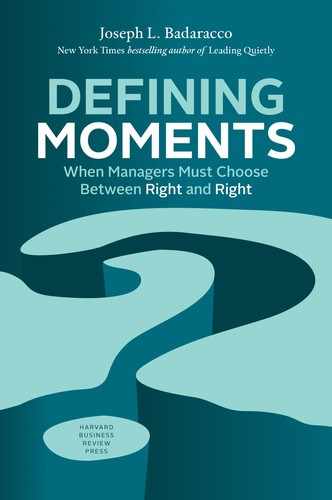64 D
EFINING
M
OMENTS
that guides and shapes an entire company. This is the task of shaping
or creating a way of life, not for a person, but for an entire organiza-
tion.
Defining moments for organizations, like those for individuals,
can be subtle, quiet, and—examined one by one—seemingly incon-
sequential. Yet, whether managers intend it or not, their decisions
and actions send continuous cumulative messages to their organiza-
tions about how things really work and about how to get ahead.
Kremlinology—the intensive interpretation of all events, however
minor, in the Soviet government—may be waning at the U.S. State
Department now that the cold war is over, but it lives on in most
companies. As one manager told me, ‘‘What many executives miss
is that there is a very tight, silent, observational relationship between
bosses and subordinates—because subordinates want to be promoted
and get higher pay and status.’’
The Kremlinology intensifies when managers face right-versus-
right issues. These differ from decisions about job assignments or
budgeting, which everyone tries to decipher to get a sense of how
the game is played and who is winning and losing. Right-versus-
right issues differ in an important way: they offer everyone a glimpse
at the ethical priorities of the people running a company, some
clearer sense of what kind of people they really are.
These glimpses aren’t merely a spectator sport; they influence
how much trust people feel they can place in their bosses. Are they
working for people who really care or who just pretend to care?
Can we trust them when they say they back our project, like our
work, or tell us that the layoffs are finally over?
At the organizational level, defining moments compel managers
to reveal, test, and choose the ethics of their organization. Defining
moments shape an organization because they cut through all of the
finely crafted pronouncements about what the company aspires to
do and reveal instead what it actually does. These episodes set
precedents and create expectations that shape a company for years
or even longer. They define the purpose of the organization and at
the same time how the organization will pursue its purpose. Defining
moments can matter as much to the life of an organization as they
do to the life and career of a manager.
Defining Moments 65
Defining moments also indelibly color the image that employees
and others have of an organization and its leader. Clearly, defining
moments are high-stakes episodes. At risk are not only a manager’s
personal commitments and values, but the character and morale
of an organization as well. Stevens, for example, was the manager
of a large domestic staff. There can be little doubt that the story of
his choice on the final night of the conference was told and retold
for years. Some members, perhaps many, were disappointed or re-
pelled by what Stevens did. Nevertheless, he had set almost in stone
an example of the commitments, values, and standards that would
prevail at Darlington Hall.
Managers are the ethics teachers of their organizations. This is
true whether they are saints or sinners, whether they intend to teach
ethics or not. It simply comes with the territory. Actions send signals,
and omissions send signals—almost everything does. Hence, respon-
sible managers are concerned about their roles in the defining mo-
ments of their organizations. They care, that is, how their decisions
and actions reveal, test, and shape the character of their companies.
This is why right-versus-right issues are defining moments. In
these episodes, people define which moral values have the highest
priority. They also define what these values mean in particular situa-
tions—for themselves and, if they are managers, for their organiza-
tions. That is the fundamental challenge that a defining moment
can thrust into a manager’s hands, often without advance notice.
Jean Paul Sartre, Chester Barnard, Aristotle, and John Dewey
have helped us understand the nature of these problems. We will
now turn to three other philosophers—Nietzsche, William James,
and Machiavelli—for guidance on how to resolve them. They suggest
important ways of reacting thoughtfully and responsibly to defining
moments, and doing so as they arise.
The alternative is to look back on these choices, as Stevens did,
with resignation and sorrow. His story raises troubling questions.
Could Stevens have done better? Is there some way he could have
understood, as he paused outside Miss Kenton’s door, what was truly
at stake? Are we, like him, condemned to brood over retrospective
insights and to understand defining moments only after we can no
longer change anything? Stevens did, after all, grasp something
66 D
EFINING
M
OMENTS
crucial about ethical choices: they can be turning points in a person’s
life. But he learned this much too late. The rest of this book proceeds
on different assumptions: that thoughtful men and women can recog-
nize defining moments as they happen, and that care and reflection
matter greatly for resolving them well.
..................Content has been hidden....................
You can't read the all page of ebook, please click here login for view all page.
